|
|
|
Sort Order |
|
|
|
Items / Page
|
|
|
|
|
|
|
| Srl | Item |
| 1 |
ID:
152140
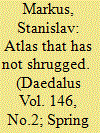

|
|
|
|
|
| Summary/Abstract |
There is demand among Russia's oligarchs for systemic change, but not for the rule of law proper. Instead, it is the defacto accountability of political elites and improved relations with the West that the Russian oligarchs want from the Kremlin. However, the oligarchs currently lack the capacity to effect change. Their insufficient leverage vis-à-vis Putin is rooted in their competition for rents, which prevents them from confronting the Kremlin as a united force. In addition to analyzing the lack of systemic pressure for change from the oligarchs, this essay considers the prospects of individual oligarchs who have nevertheless pushed openly for liberalization or tried to effect incremental change. It also draws on comparisons with other countries to chart the political behavior of Russia's business elites in the future.
|
|
|
|
|
|
|
|
|
|
|
|
|
|
|
|
| 2 |
ID:
152141


|
|
|
|
|
| Summary/Abstract |
This essay revisits the debate about Russia's “social contract,” arguing that the ability of the Russian system to maintain macro-political stability in the face of significant and prolonged micro-level economic hardship hinges on a peculiarly disengaged relationship between Russian citizens and their state. Russian citizens are seen clearly to understand the failings of the political system and leadership, reinforcing habits of “involution” learned over decades of institutional dysfunction. A review of recent protest movements, indeed, demonstrates that general quiescence coexists with a deep-seated antipathy toward the country's ruling elite, which lends particular animus to grassroots contention in a variety of settings. The question for Russia's sociopolitical future, however, remains an old one: can reactive civic mobilization lead to a proactive process of bottom-up agenda setting?
|
|
|
|
|
|
|
|
|
|
|
|
|
|
|
|
| 3 |
ID:
152138
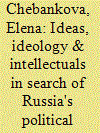

|
|
|
|
|
| Summary/Abstract |
The intellectual discourse of any state can function within two broad paradigms: consensual and pluralistic. In the first case, political elites, intellectuals, and the public agree on the base parameters of what constitutes “the good life” and argue about the methods of application. In the second case, participants hold radically different, incommensurable views, which coexist in society. This essay argues that the Western political system broadly rests on the politics of liberal consensus, formed throughout the period of capitalist modernization. But Russia's history took a different turn, following a path of alternative modernization. This engendered the politics of paradigmatic pluralism, in which a number of radically different politico-intellectual frameworks struggle for the dominant discourse. This essay examines these paradigms and argues that, due to the nature and substance of these models, fundamental change of Russia's dominant discourse, along with its main politico-institutional parameters, is unlikely.
|
|
|
|
|
|
|
|
|
|
|
|
|
|
|
|
| 4 |
ID:
152143


|
|
|
|
|
| Summary/Abstract |
This concluding essay outlines several alternative futures for Russia in the coming decades, building upon the perspectives and information in the preceding essays in this volume and relating these to my own thinking about the future of Russia. Hence, this essay does not represent a consensus of the issue's twelve authors, but rather a meld of their thoughts and my own.
|
|
|
|
|
|
|
|
|
|
|
|
|
|
|
|
| 5 |
ID:
152139
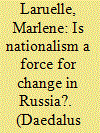

|
|
|
|
|
| Summary/Abstract |
This essay defines three categories of Russian nationalist actors: nonstate actors, whose agenda is anti-Putin; parastate actors, who have their own ideological niche, not always in tune with the presidential administration's narrative, but who operate under the state umbrella; and state actors, in particular, the presidential administration. In the future, the Russian ethnonationalism embodied by nonstate actors is the main trend that could pose a serious threat to the regime. However, the Kremlin is not “frozen” in terms of ideology, and its flexibility allows it to adapt to evolving situations. One of the most plausible scenarios is the rise of a figure inside the establishment who would be able to prevent the polarization of Russian nationalism into an antiregime narrative and could co-opt some of its slogans and leaders, in order to gradually channel the official narrative toward a more state-controlled nationalism.
|
|
|
|
|
|
|
|
|
|
|
|
|
|
|
|
| 6 |
ID:
152135


|
|
|
|
|
| Summary/Abstract |
Vladimir Putin, the person and the president, is the wild card in Russian politics. After what could be a quarter of a century in power by 2024 (either as president or prime minister), Putin's departure could prove utterly destabilizing. Russia's principal political problem is determining who or what replaces Putin as the fulcrum of the state system in the decade ahead. This essay considers the question of whether “Putin's Russia” – a hyperpersonalized presidency supported by informal elite networks – can transform into a depersonalized system that is rooted in formal institutions with clear, predictable mechanisms to mitigate the risks of a wrenching presidential succession.
|
|
|
|
|
|
|
|
|
|
|
|
|
|
|
|
| 7 |
ID:
152132
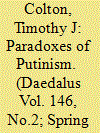

|
|
|
|
|
| Summary/Abstract |
Vladimir Putin's trademark since taking charge of Russia's government almost two decades ago has been stability. He has achieved much in terms of this master goal, including economic and demographic recovery. But development on the part of Russian society has been juxtaposed with growing rigidity and control-mindedness on the part of the state. The accumulation of economic, social, and foreign-policy problems in recent years naturally raises questions about the sustainability of the current regime. Paradoxically, Putin's personal popularity has not always been matched by confidence in his policies, although the 2014 annexation of Crimea from Ukraine gave that confidence a boost. Another paradox is that Russia bucks the global trend that seemingly links social and economic modernization to political democratization. The essays in this issue that follow will probe dimensions of this knot of puzzles.
|
|
|
|
|
|
|
|
|
|
|
|
|
|
|
|
| 8 |
ID:
152133
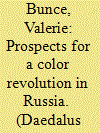

|
|
|
|
|
| Summary/Abstract |
From 1998 to 2005, six elections took place in postcommunist Europe and Eurasia that led to the defeat of authoritarian incumbents or their anointed successors, the empowerment of opposition forces, and, thereafter, the introduction of democratic reforms. Because Putin's regime closely resembles those regimes that were successfully challenged by these dramatic changes in politics, Russia is a logical candidate for such a “color revolution,” as these electoral turnovers have been termed. Moreover, the color revolutions have demonstrated an ability to spread among countries, including several that border Russia. However, the case for a color revolution in Russia is mixed. On the one hand, the many costs of personalized rule make Putin's Russia vulnerable. On the other hand, Putin has been extraordinarily effective at home and abroad in preempting the possibility of an opposition victory in Russian presidential and parliamentary elections.
|
|
|
|
|
|
|
|
|
|
|
|
|
|
|
|
| 9 |
ID:
152137


|
|
|
|
|
| Summary/Abstract |
In Putin's Russia, the regime uses the law and legal institutions to fulfill political goals, to communicate them to society, and to manage the authoritarian coalition that helps the president govern. As a result, the law is highly consequential and important, but its use tends to be arbitrary, expedient, and instrumental, rather than predictable and principled. Can we expect any major shifts in the role of law and the courts over the next ten years? Russia's legal regime is unlikely to undergo major evolutionary change and may outlive Putin's tenure: both foreign and domestic pressures for change toward constitutionalism are limited. If a positive shift were to take place, Russia would inch toward authoritarian constitutionalism. But negative change is also possible. If Putin's regime weakens, the politicized use of the courts against both dissidents and political competitors within the authoritarian coalition will increase.
|
|
|
|
|
|
|
|
|
|
|
|
|
|
|
|
| 10 |
ID:
152134


|
|
|
|
|
| Summary/Abstract |
Russian politics from the tsars through Vladimir Putin has been shaped by patronalism, a social equilibrium in which personal connections dominate, collective action happens primarily through individualized punishments and rewards, and trends in the political system reflect changing patterns of coordination among nationwide networks of actual acquaintances that typically cut across political parties, firms, nongovernmental organizations, and even the state. The “chaotic” Yeltsin era reflects low network coordination, while the hallmark of the Putin era has been the increasingly tight coordination of these networks’ activities around the authority of a single patron. In at least the next decade, Russia is unlikely to escape the patronalist equilibrium, which has already withstood major challenges in 1917 and 1991. The most promising escape paths involve much longer-term transitions through diversified economic development and integration with the Western economy, though one cannot entirely rule out that a determined new ruler might accelerate the process.
|
|
|
|
|
|
|
|
|
|
|
|
|
|
|
|
| 11 |
ID:
152142
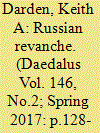

|
|
|
|
|
| Summary/Abstract |
Has the development of post-Soviet Russia in an international system dominated by a democracy-promoting United States bred an authoritarian reaction in Russia as a response to perceived threats from the West? Beginning with the NATO bombing of Yugoslavia in 1999, Russian elites have increasingly seen the United States as a distinctively threatening power, one with a strategy to exploit civic organizations, ethnic groups, and other forms of domestic pluralism as “fifth columns” in an effort to overthrow unfriendly regimes. With each new crisis in U.S.-Russian relations – Ukraine 2004, Georgia 2008, Ukraine 2014 – the Russian leadership has tightened controls over society, the press, and the state. The result is that the United States’ muscular promotion of democracy abroad has produced the opposite of its intended effect on Russia, leading successive Russian governments to balance the perceived threat from the United States by pursuing greater military and intelligence capacity to intervene abroad, and by tightening internal authoritarian controls at home to prevent foreign exploitation of the nascent internal pluralism that emerged in the wake of Communism.
|
|
|
|
|
|
|
|
|
|
|
|
|
|
|
|
| 12 |
ID:
152136


|
|
|
|
|
| Summary/Abstract |
The siloviki – Russian security and military personnel – are a key part of Team Putin. They are not, however, a coherent group, and there are important organizational and factional cleavages among the siloviki. Compared with some security and military forces around the world, Russian military and security forces generally lack the attributes that would make them a proactive and cohesive actor in bringing about fundamental political change in Russia. In the face of potential revolutionary change, most Russian military and security bodies do not have the cohesion or the will to defend the regime with significant violence. Russian siloviki are a conservativeforce supportive of the status quo. Future efforts by the siloviki to maintain the stability of the existing political order are most likely to be reactive, divided, and behind the scenes.
|
|
|
|
|
|
|
|
|
|
|
|
|
|
|
|
|
|
|
|
|